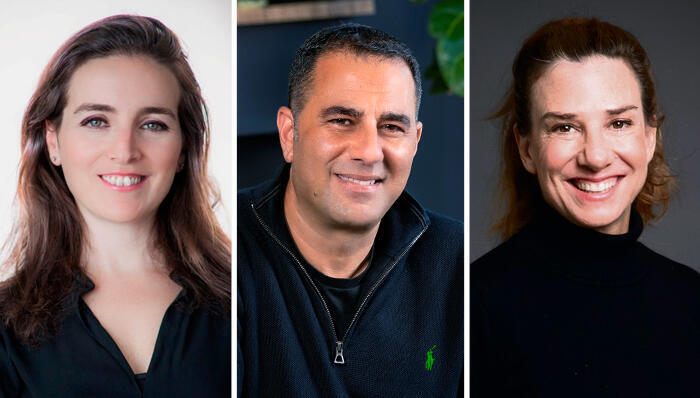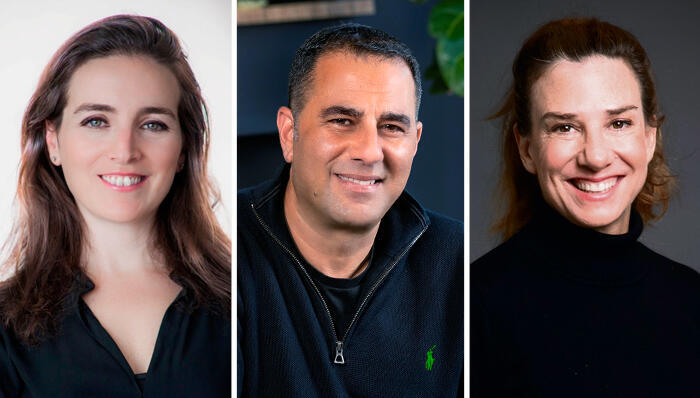
"Israel needs the world to be fundamentally dependent on its technologies"
Michal Kissos Hertzog, CEO of Poalim Tech, presented the need for a political strategy similar to the Taiwanese model. Tami Mazel Shachar, CEO of Incredibuild, advised young entrepreneurs not to look for shortcuts because "obstacles also have value." Shlomi Ben Haim, CEO of JFrog, advised them to "listen more and talk less"
"As an entrepreneur, you often have a clear sense of the challenge you are facing. But many times you discover that the real challenge is hidden, and every entrepreneur or company faces common and unique challenges. One of the ways to identify the unique challenge that my company is facing is to hear as many stories as possible of entrepreneurs and companies and to understand how they faced challenges, which is why we created this growth project," said Michal Kissos Hertzog, CEO of Poalim Tech, about Calcalist and Poalim Tech's Growth+ project, which is designed to strengthen the resilience of the high-tech industry in Israel.
1 View gallery


From left: Michal Kissos Hertzog, Shlomi Ben Haim, Tami Mazel Shachar
(Photos: Hagar Badar, Kyle Chesser)
"The goal is to be inspired, to stimulate thinking and perhaps more than anything to stimulate the magical element that every entrepreneur wishes for and that is intuition. Intuition comes after we have heard, processed and digested countless stories and experiences of others who have already done it," she says.
High-tech is the engine that drives the Israeli economy, and 2023 was a difficult year in all respects for the State of Israel and the tech industry. According to data from the SNPI research and policy institute, last year technology companies raised $7.3 billion, the lowest figure since 2018 and a 60% decrease compared to 2022. The previous year also saw a significant drop in the raising of Seed rounds. The last few months have given rise to new challenges for high-tech companies.
Understanding the challenges that the young high-tech companies have to deal with, Poalim Tech and Calcalist chose to take up the gauntlet and promote a project that is entirely based on sharing and mentoring, a project with the goal to support high-tech companies at the beginning of their journey who need, especially these days, guidance and advice to realize their dream and business vision.
“Today we can confidently say that the State of Israel does not exist without high-tech," said Kissos Hertzog. "I'm not the first and I won't be the last to say this. It's definitely not receiving enough attention, especially not at the strategic level on the part of the state. It is being treated tactically, especially by the Innovation Authority, but to make Israel essential and irreplaceable in the lives of every citizen in the world, we need a long-term strategy and implementation such as the Taiwanese model.
"The Taiwanese model is not without its shortcomings, but it has one super important dimension: Taiwan has made itself indispensable in the chip industry, and this has happened thanks to the country's national commitment to invest in its citizens by focusing on technology and improving human capital. Without minerals, coal or agricultural wealth, Taiwan has learned to recognize that its residents are the most valuable national resource, and invested heavily in technologies and made itself vital to the world.
"Israel needs to do the same thing and beyond, so that the world will be fundamentally dependent on our technologies, and several of them, not just one. And we have many opportunities and the ability to do so in areas that are critical to the world. Think of a situation where people will not be able to drink clean water without Israeli technology or to breathe air without Israeli technology, to eat or protect their data without Israeli technology. In our very modest project we are trying to help and encourage such entrepreneurs through support and mentoring from those who have already done so and penetrated the market, and thus progress and grow. This is until the country comes to its senses and builds a strategy and action plan."
One of the mentors participating in the program is Tami Mazel Shachar, CEO of Incredibuild, who believes that if she had taken part in a program like Growth+ at the beginning of her career, it would undoubtedly have helped her understand that every crisis and every success is important, and that their combination makes up a resilience that contributes greatly to success.
"Entrepreneurship or managing a young startup company requires from its leader a broad toolbox with an emphasis on the ability to combine all the areas necessary for growth and development, whether it is in the technological aspect or in the product, business, interpersonal, and managerial aspects. Above all, significant resilience in the face of failures is required. To overcome challenges that arise at every stage. The professional experience and the path I have taken have taught me how to deal with the constant roller coaster between failure and success, between depression and euphoria, and how to remain emotionally stable," she said.
According to her, "On the way to the top and success, there are many obstacles that don't always seem 'passable' or that sometimes we don't seem to have the tools or the knowledge to deal with them. Throughout my career, I realized that everything can be learned, and every obstacle is actually an opportunity. Even though I didn't come from a technological background (I studied Arabic and literature), I progressed and reached senior positions in companies on the technological front, and this without prior knowledge of the product or technology they sell. Learning and consulting are a critical thing that should be part of our personal and professional development. We should not be afraid of new and unfamiliar fields, whether it is business or technology."
She advises the young entrepreneurs not to look for shortcuts: "The path plays an important role. Even if the path is challenging and everything does not go as planned, that also has value. The challenges shape us and give us many tools to continue on the path. And when success comes, make sure not to get dizzy from it, stay focused, and direct it to continued activity and growth. And, along with successes, failures and disappointments may also come. It is important not to give up and even if you fall, you immediately get up."
Shlomi Ben Haim, CEO and founder of JFrog who also serves as a mentor at Growth+, has always believed that entrepreneurs who listen more are more successful than entrepreneurs who only talk "about the vision, the technology and the change they will lead."
"Getting the opinions of experienced people was part of our mission from the beginning," he said "Already in the first days of JFrog we recruited an advisory team precisely for the questions you have at the beginning. These became my personal advisors, and in the first stages of the company, a CEO needs smart and experienced people by his side more than anything else. They prevented me from making significant mistakes in shaping the foundations of the company.
"An initiative like Growth+ can prevent, or promote, events that will affect the company throughout its future," he says. According to him, in the early days of the company, he would listen more to advice related to the makeup of the founding team, the design of the corporate culture, raising funds (how much, how and from whom) and focusing on business growth alongside investment and development of the technological product.
"The most important things for young entrepreneurs are focus and persistence," he said. "There will always be difficulties, at every stage. If you lose focus on the necessary balance between technological success and business success, if you lose focus on everything related to the corporate culture that was born with the company's first 20 employees - you have lost the company, and it doesn't matter how much money you raised.
"In addition, I would try to emphasize how important patience is. Not everything that clearly needs to be done must be done now and urgently. The ability to take a step back and move on to a planned action that you and the organization are ready for is directly related to long-term victory."
Technology-based startups established in 2019 at the earliest that are in the Seed and pre-Seed stages are invited to register for the project. Registration will close on April 10th, and a week later, the teams of startups will be selected to receive mentorship meetings during the months of May and June.













